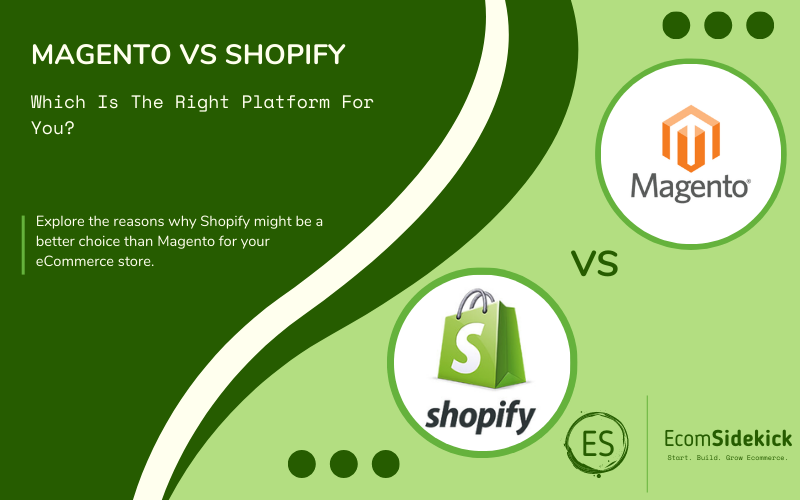I know from experience that if you are running an ecommerce store, then you need to right content management system to help you maintain and manage your store.
Two of the biggest CMS are Shopify and Magento. But why choose Shopify over Magento?
Both have some similar features that help online shop owners create and manage their content but they also come with a great variety of different functionality.

In this article, I’ll explore the pros and cons of Shopify and Magento, and I’ll find out which platform is best.
Magento Vs Shopify At A Glance
For a quick overview, here are both platforms compared with their most essential features.
- Shopify is a solution that is easy to use when you want to quickly build an online store. Store owners need to pay a monthly subscription. For this, they get all main content management features, including a page builder, templates and media upload. Shopify is suitable for both small and large businesses.
- Magento has a wealth of features, from content management to templates and email integration. Their plans are more complicated as you will need to pay for web hosting and extensions separately. This being said, Magento is a powerful ecommerce platform that is mostly used by enterprise-level companies.
The Even Parts Of The Playing Field
Before I talk more about the differences of the two platforms, let’s take a look at what they both have in common.
- Content management: Both Magento and Shopify are digital commerce platforms that allow you to upload your content, including text, images, videos and other files.
- Reporting: While the reporting is generally very basic with ecommerce platforms, both Shopify and Magento offer reports that give you an insight into product performance.
- SSL included: With both ecommerce systems, you will get an SSL that ensures your site is secure and your data is safe.
- Customer support: Shopify provides extensive customer support, just like Magento. However, Magento’s support can be limited, depending on your chosen plan.
- Add-ons and extensions: Both platforms allow you to add extensions, add-ons and apps to the backend, so you can easily add more features to your site without any coding.
Magento: Pros, Cons And Details

Magento offers a wide variety of solid ecommerce features, including extensive customization options.
Here are some of the strengths and weaknesses of Magento.
Magento Strengths
Scalability: While Magento’s initial setup requires a web development knowledge and a web developer, once the platform is up and running, you can scale it easily to fit your business needs. This means you can add more products, features and content to your website.
Community support: As an open-source platform, website developers can change Magento’s code without any problems. There is also a large community behind Magento, so you can always find support and tips online.
Customization: Magento offers a lot more customization options than Shopify. This means that you can make your online store look and feel just the way you want. You can also add features individual to your store, such as a quiz or document previews.
Magento Weakness
Considerable amount of resources required: Magento isn’t easy to set up. You will need web development knowledge or a web developer team to help you get started with Magento. Unlike with Shopify, Magento doesn’t allow you to instantly set up an online store and start adding content.
This means that you will also need to factor in additional time and costs when you want to implement Magento for your ecommerce store.
You need your own hosting: With Shopify, you automatically host your site on their platform but with Magento, you will need your own hosting setup with a hosting provider. This adds to your website maintenance costs.
Complex pricing structure: As you will need to pay for individual apps, add-ons, your own hosting and web developer, the costs for Magento’s maintenance and setup can be difficult to estimate, especially if you don’t have any previous ecommerce platform experience.
In addition, you will need to contact Magento directly to discuss a quote as they don’t provide any pricing on their website.
Generally, Magento is also much more expensive than Shopify and other CMS platforms, and that’s excluding any of the other costs, such as setup and maintenance.
Pros
Scalability
Community support
Customization
CONS
Considerable amount of resources required
You need your own hosting
Complex pricing structure
Magento Is Best For
- Enterprise businesses that have a lot of products and content
- Medium-sized businesses that want to grow fast
Shopify: Pros, Cons And Details

Shopify is a quick ecommerce solution that helps you start your online store in just a few hours. You don’t need a big budget or a lot of experience to launch your store.
Here are some of the pros and cons of Shopify.
Shopify Strengths
Great variety of responsive themes: Shopify offers a large choice of themes that are mobile responsive. This means that your online store will look good on desktop, mobile, tablet and other devices. You can also choose the right theme that fits your brand.
Large app store: You can add apps to your online store to add useful features for your customers and help you improve your conversion rate. Shopify offers a large choice of different apps that allow you to extend the functionality of your site.
Easy to use: One of the biggest advantages with Shopify is that it’s so easy to use. You don’t need a lot of website management experience to set up the store and manage your content.
Good customer support: While Shopify also has a fan base community that can help with troubleshooting, Shopify also offers direct customer support with online chat, email support and ticket system for any technical issues.
Shopify Weaknesses
Most themes aren’t free: Although Shopify has a fantastic variety of ecommerce themes, most of them come with a price tag. This being said, it can be worth spending a little bit more on the right theme, if it saves you time and effort in future.
App integration is complex: Compared to some other online store platforms, Shopify’s functionality of integrating apps and extensions on the site isn’t as easy.
Pros
Great variety of responsive themes
Large app store
Easy to use
Good customer support
CONS
Most themes aren’t free
App integration is complex
Shopify Is Best For
- Ecommerce beginners and smaller businesses
- Anyone who wants to set up their own online store instantly without a big budget or additional resources.
Shopify |
| |
Magento |
|
Final Thoughts
Experts predict that the number of ecommerce purchases will increase by 50% in the coming years.
This means that choosing the right content management platform for your ecommerce store is more important than ever.
Both Shopify and Magento offer extensive features that allow you to grow your ecommerce store at the pace of your business.
However, Shopify is more suitable for smaller businesses with slow growth, while Magento is set up for large enterprises or high-growth businesses.
Frequently Asked Questions About Why Choose Shopify Over Magento
What Is Shopify, and How Does It Compare to Magento as an E-commerce Platform?
Shopify and Magento are both popular e-commerce platforms, but they have different structures and target audiences. Shopify is a hosted platform that provides a user-friendly, all-in-one solution, while Magento is a self-hosted, open-source platform known for its scalability and customization options.
Which Platform Is Better for Beginners and Users With Limited Technical Knowledge: Shopify or Magento?
Shopify is often considered more beginner-friendly and suitable for users with limited technical knowledge. Its user-friendly interface and easy setup process make it accessible to non-technical users. Magento, on the other hand, may require more technical expertise, especially for self-hosted installations and advanced customizations.
Can Both Shopify and Magento Handle Different Sizes of Online Stores and Product Catalogs?
Yes, both platforms can handle stores of various sizes, but Shopify is often chosen by smaller and mid-sized businesses due to its ease of use and quick setup. Magento, with its powerful features and scalability, is often preferred by larger enterprises with complex needs.
Are There Significant Differences in Cost Between Shopify and Magento?
Shopify has a straightforward pricing structure with monthly plans that include hosting, security, and support. On the other hand, Magento is open-source and free to use, but self-hosted versions may incur higher costs for hosting, development, and maintenance, especially for larger and more complex stores.
Which Platform Provides Better Design Options and Customization: Shopify or Magento?
Both platforms offer customization options, but Shopify’s drag-and-drop editor and extensive theme library make it easier for non-designers to create attractive online stores. Magento, known for its flexibility, allows for deep customization but may require more development expertise.
Paul Martinez is the founder of EcomSidekick.com. He is an expert in the areas of finance, real estate, eCommerce, traffic and conversion.
Join him on EcomSidekick.com to learn how to improve your financial life and excel in these areas. Before starting this media site, Paul built from scratch and managed two multi-million dollar companies. One in the real estate sector and one in the eCommerce sector.



